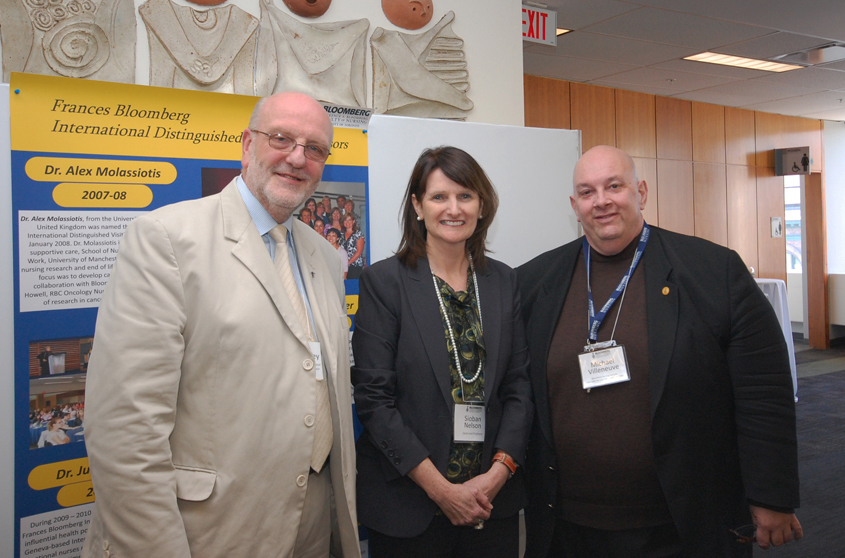Recognizing the dedication, commitment and advances nurses have made in the health care profession, Bloomberg Nursing celebrated National Nurses Week with a panel discussion on The Good, the Bad and the Political. Examining the trends in nursing and health policy from a national and international perspective, the Faculty hosted Frances Bloomberg International Distinguished Visiting Professor, Tom Keighley, FRCN (Revd) and Bloomberg Nursing Lecturer, Michael J. Villeneuve, RN MSc for a lively one hour discussion. The event, which took place on Tuesday, May 7, 2013, began with a research exhibit on the areas of study faculty members are undertaking and followed with a reception.
To watch the panel discussion, please go here.
“Many nurse leaders around the world will tell you that they love their job,” said Keighley, a British nurse well-known for his international, administration and policy work. “What wears them down, though, is responding to the political imperatives and the short-term expectations around delivering major change.”
Keighley’s politically-charged talk spoke of the struggle nurses, at all levels, experience while putting the needs of patients first while having to address the political imperatives place on them. For the presentation, Keighley drew on his 40 years of nursing experience including the establishment of the ethics function of the Royal College of Nurses in England, leading new quality initiatives in service delivery, and being the first nurse invited to the European Union Leadership Programme, to illustrate the different agendas facing the health care profession.
As he stated near the end of his talk, “as a nurse, most of us came into the profession in order to care for patients with a focus that has been, and remains on, providing care.” He ended with a sobering question: “how do we meet that while managing the political yearnings of politicians who, in many cases, are working with an agenda that doesn’t involve better patient care?”
Political agendas play a role in health care internationally, and Canada certainly falls into that arena. Switching from a European to a Canadian perspective, Villeneuve presented the facts and figures associated with health care costs.
“Steadily increasing since 1970, we’re now spending roughly $200-billion on health care and we’ve increased our lifespan by about 10 years so it looks like we’re spending money in a worthy fashion,” said Villeneuve, a former executive lead of the National Expert Commission. “For that investment we might think that we’re purchasing health but really, what we’re purchasing is a lot of care when we need to be purchasing health outcomes.”
Giving a detailed breakdown on the costs of Canadian health care and the outcomes compared to the rest of the world, Villeneuve deftly articulated how Canada ranks high in terms of cost per capita but with less to show in terms of quality and health outcomes for the money spent. Recognizing that the system has to change, Villeneuve concluded his presentation with a call to action that resonated with the nurses and nursing students in attendance.
“Nurses could be, and should be a mighty force for change,” said Villeneuve. “We are producing the most educated generation of registered nurses in Canadian history and we need to harness their skill to have a demonstrable impact on population health.”
Additional photos are up on our Facebook page.
[easyrotator]erf_51_1438709686/erc_57_1438709710[/easyrotator]
